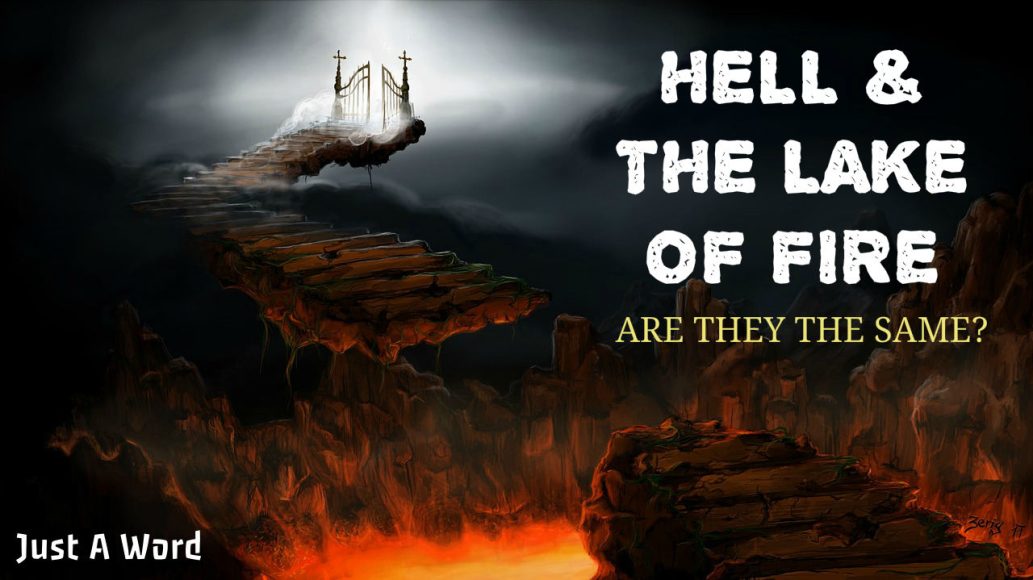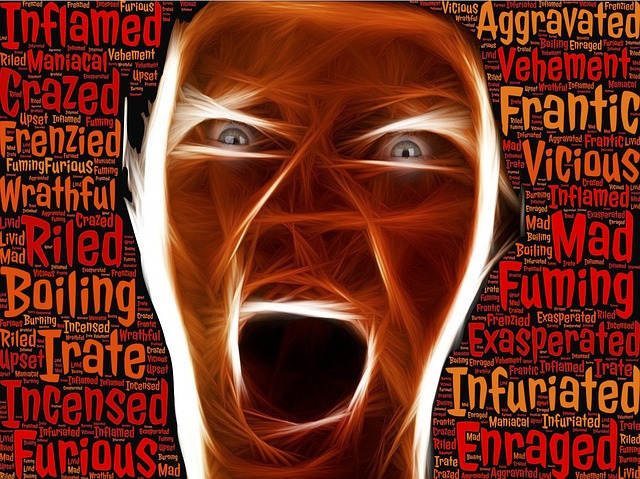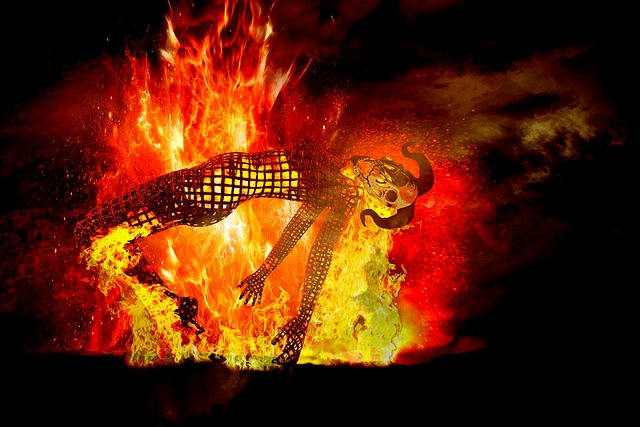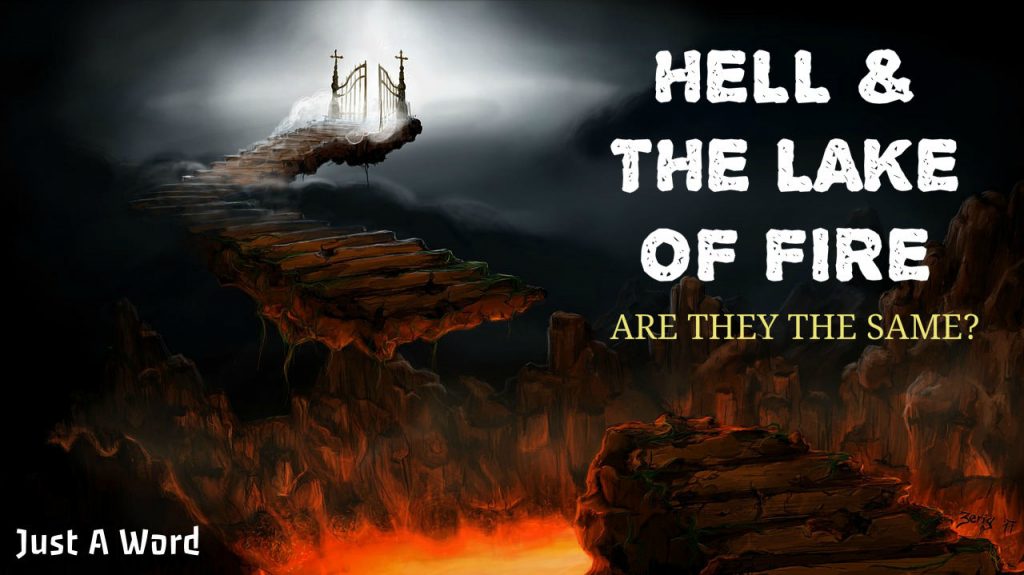
Are Hell and the Lake of Fire referring to the same place?
We often hear of the place in the Bible called hell. Much has been said about this dreaded place, a place of torments, a place no one will feel comfortable. At another place we hear of the lake of fire and that hell itself will be thrown in the lake of fire. Are they the same or different? Let’s see.
Question?
This study came out of a question in our Biblical Truth-Seekers WhatsApp group. The question was…
Apostles’ Creed reads, “was crucified, dead, and buried, he descended into hell; the third day he rose again from the dead.” I am asking about the descending to hell part. It does not mention the key but can you teach what you know on this subject.
Reply
I found nothing in the book that directly says that HaMashiach went down to hell. However, I found verses from which they probably made the deduction.
1Pe 4:5 — 1Pe 4:6
Who shall give account to him that is ready to judge the quick and the dead. For this cause was the good news preached also to them that are dead, that they might be judged according to men in the flesh, but live according to Elohiym in the spirit.Revelation 1:18
I am he that liveth, and was dead; and, behold, I am alive for evermore, Awmane; and have the keys of hell and of death.Eph 4:8 — Eph 4:10
Wherefore he saith, When he ascended up on high, he led captivity captive, and gave gifts unto men. (Now that he ascended, what is it but that he also descended first into the lower parts of the earth? He that descended is the same also that ascended up far above all heavens, that he might fill all things.)
So one can look at these 3 sets of verses and say, yes, he went down to hell. He indeed went down to hell, but we shall see that what WE call hell in the Bible is not what we think it is. Confused? Good.
What the Bible calls “hell” is known in old testament Hebrew as “sheol” or in new testament Greek as “hades.”
2 Samuel 22:6
The sorrows of hell compassed me about; the snares of death prevented me;
English: hell
Hebrew
Transliteration: she’ôl she’ôl
Pronunciation: {sheh-ole’} sheh-ole’
Definition: From H7592; hades or the world of the dead (as if a subterranian {retreat }) including its accessories and inmates: – {grave} {hell} pit.
KJV Usage: grave (31x), hell (31x), pit (3x).
Hell in the Bible means the grave, as in a subterranean retreat: the world of the dead (both righteous and unrighteous).
Meaning of Subterranean
-
existing, occurring, or done under the earth’s surface.“the terrors and hazards of subterranean exploration”
Let us see its use here again as the temporary resting place of the dead before the judgment.
Psalms 30:3
O Most High, thou hast brought up my soul from the grave: thou hast kept me alive, that I should not go down to the pit.
The meaning of “grave” as used in Psalms 30:3?
Hebrew
Transliteration: she’ôl she’ôl
Pronunciation: {sheh-ole’} sheh-ole’
Definition: From H7592; hades or the world of the dead (as if a subterranian {retreat }) including its accessories and inmates: – *{grave}* {hell} pit.
KJV Usage: *grave* (31x), hell (31x), pit (3x).
Now Psalms 30:3 is very revealing as it pairs “grave” with the English word “pit” which is actually a description of the grave. Let us see how David described the grave by looking at the meaning of *pit:*
Meaning of *pit* as used in Psalms 30:3…
English: pit
Hebrew
Transliteration: bôr
Pronunciation: bore
Definition: From H952 (in the sense of H877); a pit, hole (especially one used as a cistern or *prison*): – {cistern} *{dungeon}* {fountain} {pit} *well*.
KJV Usage: *pit* (42x), cistern (4x), *dungeon* (11x), well (9x), dungeon (with H1004) (2x), fountain (1x).
So we see the grave being described as a prison, a dungeon, a hole.
In a previous teaching, we had looked at this temporary place of the dead in Enoch 22. This is what the Bible calls hell. However, what WE call hell is actually what the Bible calls “the lake of fire.”

Let us look at the use of the Greek equivalent *hades* and these verses in Revelation will show definitively that what we call hell is an error.
Rev 20:13 — Rev 20:15
And the sea gave up the dead which were in it; and death and hell delivered up the dead which were in them: and they were judged every man according to their works. And death and hell were cast into the lake of fire. This is the second death. And whosoever was not found written in the book of life was cast into the lake of fire.
So death and hell delivered up the dead. These refer to temporary states (the first death).
Next the meaning of death:
Greek
Transliteration: thanatos
Pronunciation: than’-at-os
Definition: From G2348; (properly an adjective used as a noun) death (literally or figuratively): – X deadly (be . . .) death.
KJV Usage: death (117x), deadly (2x).
No surprise here: death refers to the state of being dead. The adjective being used as a noun as a general title for the dead.
Before I go further, let me just look at the 3 main nouns in Rev 20:13-15
1) death
2) hell
3) lake of fire
So next, let us look at the meaning of hell as used in the Greek.
English: hell
Greek:
Translation: hades
Pronunciation: hah’-dace
Definition: From G1 (as a negative particle) and G1492; properly unseen that is Hades or the place (state) of departed souls: – *grave,* *hell*.KJV Usage: hell (10x), grave (1x).
So hell is again shown to be the place of departed souls. This would include both the righteous and unrighteous. It did not say the place of sinners, it says departed souls . So the first death leaves men (mankind) in a temporary holding place until the day of judgment. Then the condemned will be sent to the lake of fire.
We shall see more vivid detail from the books of Chanoch (Enoch) and the book of 2 Esdras (Ezra) soon. Take a look at the video below which summarizes how hell is separated into different sections, separating the sinners from the righteous. This is confirmed and examined in more detail in 2 Esdras.
What we call hell is actually the lake of fire
Revelation 20:14
And death and hell were cast into the lake of fire. This is the second death.
So the lake of fire is what we actually call hell. Hell is not a permanent place, it is only temporary, where the dead await the judgment. The lake of fire is the danger. It is the final destination of the devil, his angels and sinners. The lake of fire is what we mean when we say hell.
Got It?
Now look at the book of Enoch explicitly confirming this…
Hell as temporary place of abode after first death, waiting on the judgment…
Chanok (Enoch) 22:
22:1 From there I proceeded to another spot, where I saw on the west a great and lofty mountain, a strong rock, and four delightful places.
22:2 Internally it was deep, capacious, and very smooth; as smooth as it had been rolled over: it was both deep and dark to behold.
22;3 Then Raphael answered, one of the holy angels who was with me, and said unto me: ‘These hollow places have been created for this very purpose, that the spirits of the souls of the dead should assemble therein, yea that all the souls of the children of men should assemble here.
22:4 And these places have been made to receive them till the day of their judgement and till their appointed period ?till the period appointed?, till the great judgement (comes) upon them.’*
That is hell (sheol/hades).
Got it?
This is as close a description as we get.
Dwelling Places of the Dead
We see it plainly in the story of Lazarus the beggar.
Luk 16:19 -22
There was a certain rich man, which was clothed in purple and fine linen, and fared sumptuously every day:
And there was a certain beggar named Lazarus, which was laid at his gate, full of sores,
And desiring to be fed with the crumbs which fell from the rich man’s table: moreover the dogs came and licked his sores.
And it came to pass, that the beggar died, and was carried by the angels into Abraham’s bosom: the rich man also died, and was buried;
And in hell he lift up his eyes, being in torments, and seeth Abraham afar off, and Lazarus in his bosom.Luk 16:25 But Abraham said, Son, remember that thou in thy lifetime receivedst thy good things, and likewise Lazarus evil things: but now he is comforted, and thou art tormented.
Luk 16:26 And beside all this, between us and you there is a great gulf fixed: so that they which would pass from hence to you cannot; neither can they pass to us, that would come from thence.
Lazarus was taken into Abraham’s bosom. Where or what is Abraham’s bosom? I rarely quote from secular sources, but here I give a quote from Wikipedia, as I could not have said it any better:
“Bosom of Abraham” refers to the place of comfort in the Biblical Sheol (or Hades in the Greek Septuagint version of the Hebrew scriptures from around 200 BC, and therefore so described in the New Testament) where the righteous dead await Judgment Day.
So contrary to what many teach, that did not occur in heaven, but in sheol or hell.
Importantly, it speaks of torment in hell even before the lake of fire. No rest for the wicked. Additionally, it speaks of a separation between both dwelling places (a great gulf fixed). They can see each other, but cannot pass one to the other.
Related: Are you a saint? Find out why it is important that we know
The book of 2 Esdras (from the Apocrypha) confirms this and gives us more detail.
If the spirit belonged to one of those who showed contempt and didn’t keep the Most High’s way, if it was one of those who despised his Law and who hates those who fear God, these spirits don’t go into their dwellings but will immediately wander about in torments.They will constantly grieve and be sorrowful for seven reasons:The first reason—because they despised the Law of the Most High.The second reason—because they can’t now effectively change their hearts and lives so that they might live.The third reason—because they will see the reward laid up for those who have believed the Most High’s testimonies.The fourth reason—because they will consider the torment laid up for themselves in the last days.The fifth reason—because they will see the dwelling places of others, guarded by angels in great silence.The sixth reason—because they see the torment coming upon them from now on.The seventh reason, which is greater than all the previously mentioned reasons—because they will melt away in confusion and be consumed in disgrace.“They will wither in fear when they see the glory of the Most High, before whom they sinned when they were alive and before whom they are to be judged in the last times.
The spirits of the unrighteous will wander around in torments and will be able to see the dwelling places of the righteous. On the other hand:
“The arrangement for those who kept Elohiym’s ways is this when they begin to be separated from the corruptible body.In the time of their exile here they labored hard to serve the Most High. Every hour they endured danger so that they might keep the Law of the lawgiver perfectly.Therefore, this is the word about them:First, they will see with great joy the glory of him who receives them. They will have rest on account of seven orders:The first order—because they have struggled hard to overcome the evil thought fashioned within them so that it wouldn’t lead them astray from life to death.The second order—because they see the panic in which the souls of the wicked wander and the punishment that awaits them.The third order—seeing the testimony that their maker has testified on their behalf, because when they were alive, they kept the Law that was given through faith.The fourth order—understanding the peaceful rest that they now enjoy, gathered in their resting chambers, guarded by angels in deep silence, and understanding the glory that awaits them in their last days.The fifth order—rejoicing at how they have now escaped the corruptible and how they will have a future inheritance; moreover, seeing the narrow space, full of labor, from which they have been freed, and the spacious place they are about to receive and enjoy, now that they are immortal.The sixth order—when they are shown how their face begins to shine like the sun and how they begin to be like the stars, as beings of incorruptible light.The seventh order, which is greater than all those mentioned—because they will rejoice with confidence and will trust without being disappointed and will rejoice without fear; for they hasten to see the face of him whom they served when they were alive and from whom they are about to receive a reward now that they are glorified.
This is definitely not encouraging sinners at all and shows why we must live in righteousness and true obedience. At the same time we must try to reach sinners so they can be saved from the wrath to come.
What About the Thief on the Stake?
What about the thief on the stake (cross), where did he go? Did he go to heaven as has been deduced from this verse?
Luk_23:43 And Yahushua said unto him, Verily I say unto thee, To day shalt thou be with me in paradise.
Paradise is the kingdom and today means that instant, with that statement of faith, he has booked his spot in the kingdom.
This is one verse we erroneously use to say the thief is in heaven. It does not literally mean that he is going with the Messiah into heaven. But every man who dies goes to hell (the holding area) first to await the judgment.
The thief on the stake and all those who die in the Messiah will not wait until the judgment, but will rise to be with him when Messiah returns to the earth…
1 Thessalonians 4:16 – 17
For the Master himself shall descend from heaven with a shout, with the voice of the archangel, and with the trump of Elohiym: and the dead in HaMashiach shall rise first: Then we which are alive and remain shall be caught up together with them in the clouds, to meet the Master in the air: and so shall we ever be with the Master.
Notice for the judgment it said:
Revelation 20:13
And the sea gave up the dead which were in it; and death and hell delivered up the dead which were in them: and they were judged every man according to their works.
There were 3 places stipulated as giving up the dead for judgment: the sea, death and hell. It did not say that heaven gave up the dead. The thief on the stake has to face judgment like all of us.
So the thief on the stake, like everyone else, is in hell waiting for the judgment but he has already booked his place, as his name is written in the lamb’s book of life. We have already seen that hell (sheol/hades) has divisions to separate the righteous from the unrighteous.
What about Enoch?
A Question was asked by a member of the group:
“Could he (the thief) be in heaven like Enoch?”
Reply: “Where does it say Enoch is in heaven?”
Response: “I thought he ascended to heaven.”
Reply:
Hebrews 11:5
By faith Enoch was translated that he should not see death; and was not found, because Elohiym had translated him: for before his translation he had this testimony, that he pleased Elohiym.
That’s what I am getting at. The word “TRANSLATED” as used in Hebrews 11:5, matches up with what Enoch described in the book of Enoch. There he revealed he was taken and transformed in the spirit, where he was taken all over the earth as well as in heaven. No indication I have so far seen that his resting place is in heaven.
So, it did not say Enoch was in heaven, as in, he took up residence there. He was taken to heaven in the spirit whilst still alive, just as Yahuchanon (John) was taken there in the book of Revelation.
Revelation 4:2 And immediately I (John) was in the spirit: and, behold, a throne was set in heaven, and one sat on the throne.
This verse is very telling:
John 3: 13 King James Bible
And no man hath ascended up to heaven, but he that came down from heaven, even the Son of man which is in heaven.
Conclusion
That’s it. After the first death, we wait in sheol/hades/hell until judgment. There are separate dwellings there for the righteous and the unrighteous. Those deemed righteous will rest in peace, but the unrighteous will be tormented. No rest in peace.

Then at the judgment it gets even worse for the sinner: a final sentence to the lake of fire which was prepared for the devil and his angels.
What is ironic, is that some Christians believe when they die they go to heaven. Instead, when we die, we all go to hell first, just as the Messiah did (1 Peter 4:5-6, Ephesians 4:8-10). Then after the judgment we will either go to the lake of fire or into the kingdom of heaven (which will be here on earth). All this depends on the judgment.
See my video: “Where Is The Kingdom of Heaven and Why It Is Important That We Know.”
I would love to hear your comments. Please leave them in the comment box below.
Related: Will “God” understand? What does the Bible say?


I couldnt find the verses you was reading from in my kjv 1611,
I don’t know which verse you are referring to, Eleazar. State the verse and let us see.